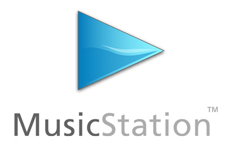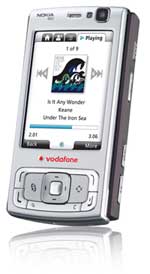 I have a question for you. How do you like your music?
I have a question for you. How do you like your music?
Do you want to own it?
Do you want to rent it?
Or do you prefer getting it in some back alley on the Web?
The reason I ask is because Vodafone, a leading international mobile telecommunications carrier, will launch Omnifone’s MusicStation in the UK on three handsets in time for Christmas. Omniphone is a mobile music provider, and its MusicStation offers an all-you-can-eat subscription for a small weekly fee.
 Omnifone launched in June, and Scandinavian operator Telenor became the first to make MusicStation available to its subscribers. Following the Sweden launch, Omnifone is expected to rollout in Europe, Asia-Pacific, and Africa.
Omnifone launched in June, and Scandinavian operator Telenor became the first to make MusicStation available to its subscribers. Following the Sweden launch, Omnifone is expected to rollout in Europe, Asia-Pacific, and Africa.
Industry analysts have already pegged MusicStation as the next iTunes Music Store, Rhapsody, and eMusic. With its imminent availability through Vodafone, the Internet-age-old question is raised once again: Will people pay for recorded music?
Apple’s Steve Jobs has bet the ranch that people want to own their music, and that’s how the iPod ecosystem is set up. You buy music from the iTMS and sync it to an iPod or iPhone. It’s the model that’s been accepted by music lovers the most — so far.
Rhapsody is a subscription-based music service that gives you unlimited access to a catalog of millions of CD-quality songs. The “rent your music” approach is appealing to some, but not to others. It has yet to overtake the “I-want-to-own-my-music” mentality and mirror the success of the iTMS.
But the iTMS, Rhapsody, and all the other online music retailers are competing against the industry’s big, bad bully — pirated music. Many industry analysts believe that piracy is crushing both the “own it” and “rent it” models.
So in this climate, how can MusicStation succeed where others — most notably subscription-based models — have failed?
MusicStation, hailed as the most significant online music venture since iTunes, is surprisingly appealing and pokes competitors in their weaknesses.
 For the weekly fee of £1.99 (£2.99 for the service that runs on a PC or Mac) you can download as much music as you want. Most importantly, this fee covers all data charges, which have been costly and have kept people from downloading more music and utilizing the carriers’ 3G networks.
For the weekly fee of £1.99 (£2.99 for the service that runs on a PC or Mac) you can download as much music as you want. Most importantly, this fee covers all data charges, which have been costly and have kept people from downloading more music and utilizing the carriers’ 3G networks.
All four music labels are behind MusicStation — the Universal Music Group, Sony BMG, EMI, and Warner. These labels do not participate in every downloading service, including eMusic’s.
Unlike Rhapsody and iTunes, MusicStation is truly mobile. You can download any song, anywhere, anytime, which you cannot do with desktop-based Rhapsody or iTunes.
(Just last week, Apple announced the availability of the iTunes Wi-Fi Music Store, which allows you to download songs from iTunes into an iPhone or the new iPod Touch but not to other iPods.)
Unlike Nokia’s music store, MusicStation is expected to run on 70 percent of the world’s handsets, not just on Nokia phones. Vodaphone is beginning with the Nokia N95, Sony Ericcson’s W910i, and Samsung’s F700. MusicStation is cross-carrier, so you can take your music with you when you change carriers.
MusicStation is also forgiving. If you lose your handset, you don’t lose music you paid for. Simply get another MusicStation-enabled handset, and your music is there.
Finally, MusicStation is friendly — to a point. You can share music and playlists with anybody who subscribes to the service.
For now, it will be slow to gauge the success of MusicStation because it’s available only in Sweden and soon in the UK. But within the year, Omnifone notes, MusicStation will be offered by 30 mobile operators throughout Europe, Asia-Pacfic, and Africa, with the possibility of being on 100 million phones within the year.
Maybe then we’ll have an answer.

Wow. Compared to what you pay for data now, it would seem hard to absorb the data rates at that cost. The mobile networks must be really pushing it to get into the game. Just one more proof that there has been price fixing to allow them to control the market. Normally there would easily be competition going on for this type of market.
It is a good idea though. Chop the player out of the equation and rely on software and the network.